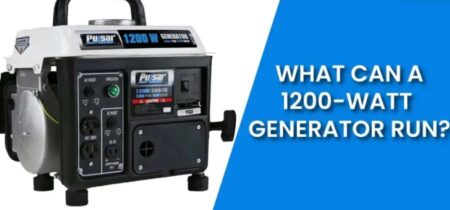
We rely greatly on electricity as most of our devices and appliances are powered by it. So, if the power goes out, we could be facing massive inconvenience and most of our work can halt. Being without electricity may make you feel exposed and nervous whether it’s because of a storm, a power outage, or scheduled maintenance.
When the electricity goes out, a whole-house generator may provide a reliable source of backup power to keep your home functioning smoothly. One question that many people have is whether a whole house generator runs an air conditioner for your convenience. Air conditioning can be crucial to keeping your house pleasant and comfortable during the sweltering summer months.
Yes, a whole-house generator can power your air conditioner to give you a quick answer. While operating a generator to power your AC unit, there are a few things to keep in mind including the type of generator being used, safety precautions, and purchase factors. Let’s dive in to address all your questions.
can a whole house generator run air conditioner
Before you buy a generator to run your air conditioner, you should be aware of the different types of generators in the market .
- Portable Generators: Portable generators are lightweight mobile generators that may be used in different conditions. They have the ability to power electronics, small appliances, and tools and are commonly powered by gas or propane.
- Inverter Generators: Inverter generators use the most updated technology to provide clean reliable electricity. They’re perfect for camping, picnics, and other outdoor activities since they tend to be more fuel-efficient and quieter than traditional generators.
- Standby Generators: In the case of a power outage, a standby generator is a bigger generator that is intended to supply backup power to a house or company. They are frequently fueled by natural gas or propane and are directly connected to a house’s electrical system.
- Commercial generators: Commercial generators are large generators designed to provide emergency power to industrial and commercial buildings including factories, data centers, and hospitals. They can generate an abundance of power for a long time and are often fuelled by diesel or natural gas.
- Solar Generators: The generators which use solar panels to turn sunlight into electricity are known as solar generators. They are often lightweight and quiet and are perfect for camping, RVs, and other outdoor activities.
- Wind generators: They’re typically used in isolated regions without access to conventional power sources including on boats, in cabins, or in off-grid residences.
Portable generators and standby generators are the two types of generators that you can use to power an air conditioner. Yet, it’s very important to choose a generator with enough strength to manage the electrical load placed on it demanded by your air conditioner. The starting power of an air conditioner might be higher than the power needed to continue running the A.C
What Size Generator Do You Need to Run an Air Conditioner?
To determine the appropriate size of a whole house generator needed to run an air conditioner, the wattage requirements of the AC should be considered. The size of the generator needed depends on the size of the air conditioner, as a 4-ton air conditioner requires a 14-kilowatt generator while a 5-ton air conditioner requires a 17-kilowatt generator.
During the startup of an air conditioner, it can consume as much as three times the amount of wattage it needs to run. Therefore it’s crucial to consider the initial startup wattage and the wattage required to keep the AC running. For instance, if the air conditioner requires 3,500 watts on initial startup and 1,000 watts to keep running, a 4,000-watt generator would be sufficient to power the AC. Similarly, if the AC needs 5,000 watts to start up and 1,500 watts to continue running, a 6,000-watt generator is required.
How to Connect an Air Conditioner to a Generator?
The ease or difficulty of connecting your air conditioner to your generator depends on the type of setup you have. For portable or window air conditioners, connecting them to a portable generator is a simple matter of plugging the cord end into the generator after starting it. However, the process becomes significantly more complicated when connecting a mini-split or central air conditioning system to the generator.
- Check for The Transfer Switch
Before connecting a generator to power your furnace, it’s very important to check if you have a transfer switch installed between your furnace and circuit breaker. This switch is typically installed by a professional electrician and enables you to connect your generator safely. If you do not have a transfer switch installed, it is recommended to contact an electrician to install one before proceeding with the generator connection process.
- Turn off the Circuit Breaker and Gather Important Materials
You must turn off the circuit breaker that connects to your furnace in the first place before starting any work to ensure your safety and avoid electrocution. Gather all the required equipment, such as wire cutters, an extension cord, and the generator itself, once the power supply is turned off so that you have everything needed to complete the project.
- Rewire the System
To rewire the system, you must first disconnect the wire that connects the furnace to the circuit breaker. Then, install a new outlet to the breaker panel. Ensure that the wires run from the circuit breaker to the furnace with the added outlet so that you can easily plug in the generator when it is required.
- Connect the Plug to the Furnace and Test
Next, you need to attach the plug to the side of the furnace and connect it to the power source. Then, plug the furnace back in and reset the breaker. Test the furnace to ensure that it’s working properly and make sure that the generator is also connected and functioning correctly.
- Plug in the Generator for Backup Power
To ensure safety, find a secure spot for the generator away from the house or any enclosed area as it emits carbon monoxide. It is also vital to keep it away from kids and water. When there’s a power outage, connect your furnace to the generator using an outdoor extension cord. Be mindful not to overload the generator, as it can lead to an inability to heat or cool your home.
Why Do You Need Stronger Generators to Run an Air Conditioner?
You need a larger powerful generator to run an air conditioner since they use more electricity to start up than to continue operating. Starting the AC requires more electricity to get the engine moving and this initial power demand can be up to three times higher than what’s needed to keep the air conditioner running.
To start the motor moving and out of its state of inertia, a power surge is required. The air conditioner won’t turn on and the generator or air conditioner can get damaged if the generator is not powerful enough to manage the initial rush of power.
Safety Precautions Before Using a Whole House Generator to Run an Air Conditioner
It’s important that you take some safety measures before running your air conditioner with a whole house generator to prevent any mishaps or damage. A generator may save your life if the electricity goes out, but if not operated properly, it can also be hazardous. These are four crucial safety precautions to bear in mind while running an air conditioner with a whole-house generator.
- Proper Ventilation: Ensure sure the generator is positioned away from windows and doors where exhaust fumes might enter your home and in a well-ventilated location. At least three to four feet of clearance should be allowed around the generator.
- Install carbon monoxide detectors in your house so that they can warn you if the levels of the gas rise dangerously. This precaution is necessary because carbon monoxide, an odourless and colourless gas may be fatal if you inhale it in large doses.
- Grounding: Ensure that your generator is grounded properly to avoid electrical shock and follow the manufacturer’s instructions for grounding. Make sure that the grounding wires are connected properly.
- Maintenance: Keep your generator well-maintained and regularly serviced to ensure that it operates safely and efficiently. Follow the manufacturer’s recommended maintenance schedule and inspect the generator before each use. Don’t attempt to repair or service the generator yourself unless you have the necessary training and experience.
Can a Whole House generator Run Multiple Air Conditioners at Once?
Yes, a whole house generator can run multiple air conditioners but it needs to have enough power output. Add up the starting and running wattage of all air conditioners and ensure that the selected generator has enough capacity to meet those requirements. Well, then you’re good to go!
What else can a Whole House Generator Run?
A whole house generator can power various appliances and devices, depending on its size and capacity. In addition to running an air conditioner, it can power essential items such as refrigerators, freezers, lights, and communication devices like televisions and computers. It can also power medical equipment and electric heating systems
Conclusion
A whole house generator can provide homeowners with peace of mind during power outages by ensuring that their essential appliances and systems continue to function seamlessly. A whole home generator may power a wide range of appliances and devices, from refrigerators and freezers to computers and televisions.
Although air conditioning systems require a powerful generator. It’s important to consider your specific requirements when purchasing a whole house generator like the size of your home and the items you need to power. A whole house generator may be a smart investment that can get you through any power loss with appropriate installation and routine maintenance.
Also Read:
HOW TO CONNECT A GENERATOR TO A HOUSE WITHOUT TRANSFER SWITCH








